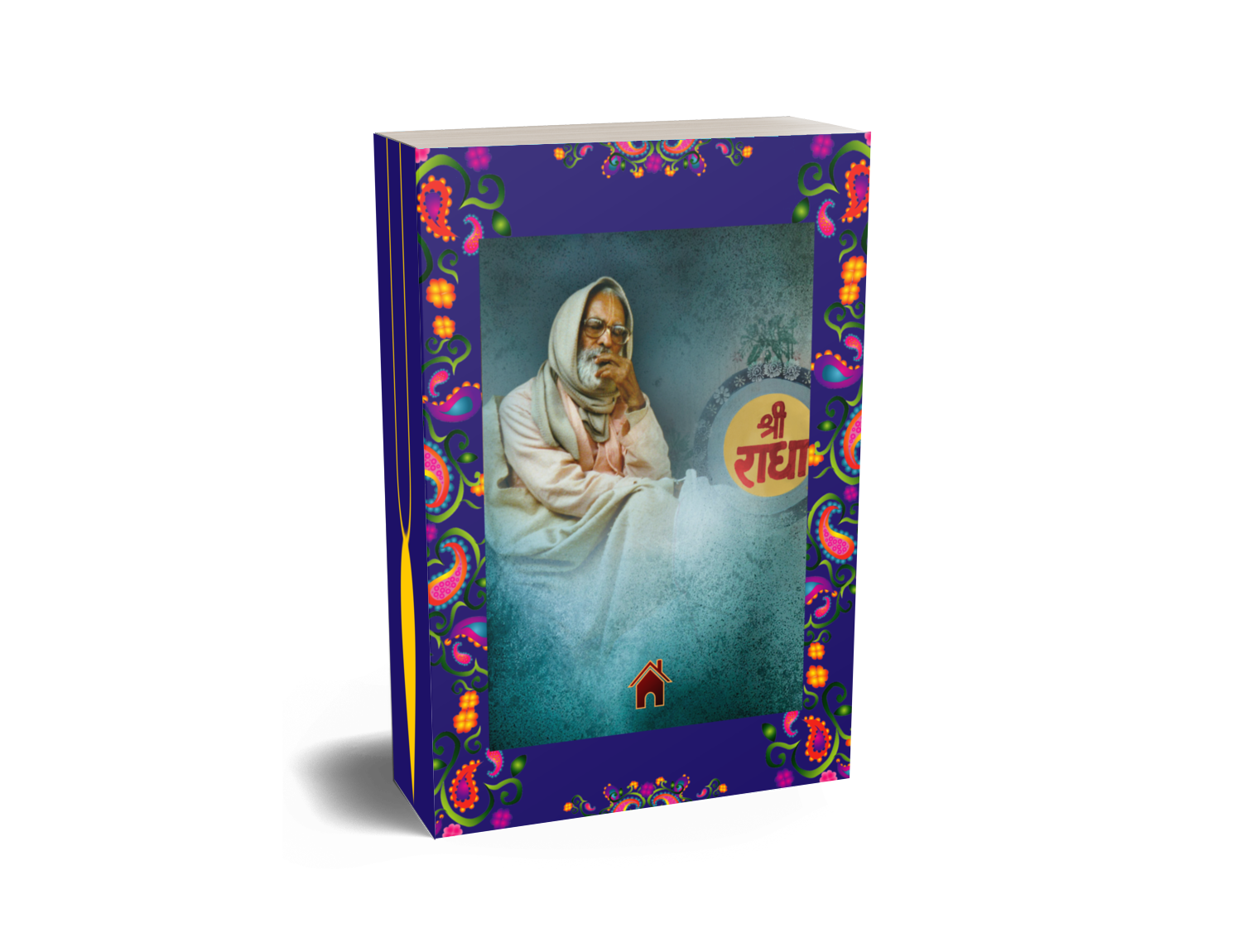

The following transcription contains an excerpt from a darśana with Śrīla Bhaktivedānta Nārāyaṇa Mahārāja in Berkeley, California on June 10, 2000
Śrīla Bhaktivedānta Nārāyaṇa Mahārāja: What is the name of that Prabhu?
Devotee: [Name withheld] dāsa. He is Śrīla Prabhupāda’s disciple.
Śrīla Bhaktivedānta Nārāyaṇa Mahārāja: He is very intelligent and he wants to know the philosophy. I think he is very innocent. (addressing [Name withheld] Prabhu) You should try to be much more qualified, especially in the established truths of our line. Read Jaiva Dharma and be a master of all established truths. From the beginning I have been reading Jaiva Dharma, and what you see in me is only the mercy of Jaiva Dharma.
[Name withheld] dāsa: I am seeing things more clearly in your association, Mahārāja. With the light of truth, one 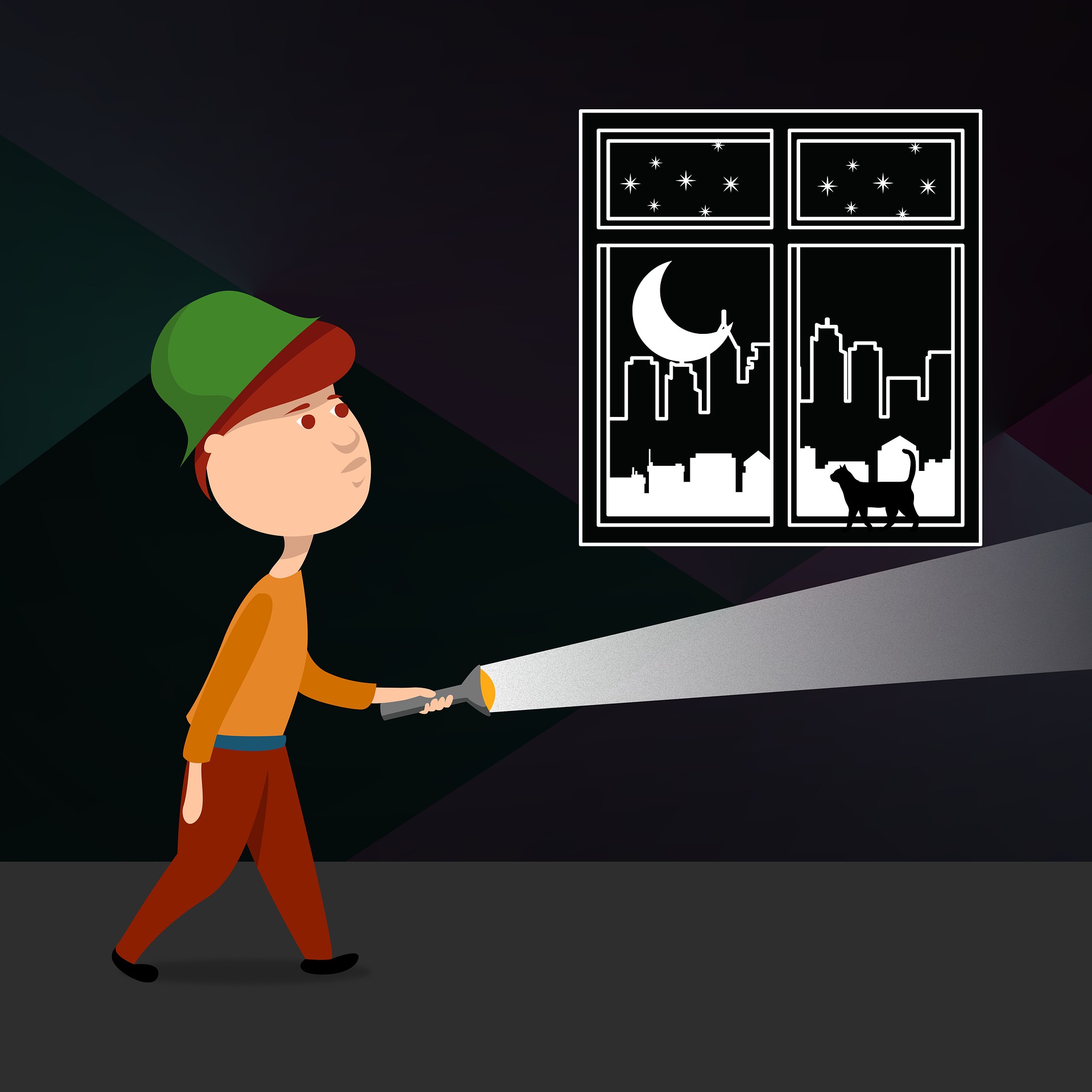 can see the darkness and one can see what is what. On the Internet there is so much ignorance about truth and your position. You’ve become very controversial because you speak the truth. There are so many common misconceptions due to institutional religious grāmya-kathā. And this is due to superficial understanding because of no proper guidance.
can see the darkness and one can see what is what. On the Internet there is so much ignorance about truth and your position. You’ve become very controversial because you speak the truth. There are so many common misconceptions due to institutional religious grāmya-kathā. And this is due to superficial understanding because of no proper guidance.
Śrīla Bhaktivedānta Nārāyaṇa Mahārāja: Do you know why the Vedas are called ‘śruti’?
[Name withheld] dāsa: Because of hearing. They are heard.
Śrīla Bhaktivedānta Nārāyaṇa Mahārāja: Why not by reading? There is some deep meaning. No one can understand the special truths of śāstra by reading. Do you remember this śloka?
nāyam ātmā pravacanena labhyo
na medhayā na bahunā śrutena
yam evaiṣa vṛṇute tena labhyas
tasyaiṣa ātmā vivṛṇute tanūṁ svām
(Muṇḍaka Upaniṣad 3.2.3)
[“The Supreme Lord is not attained by expert explanations, by vast intelligence or even by much hearing. He is attained only by one whom He Himself chooses. To such a person He manifests Himself.”]
[Name withheld] dāsa: Yes, but actually I haven’t heard it; I’ve read it.
Śrīla Bhaktivedānta Nārāyaṇa Mahārāja: What is the meaning of this śloka?
Śrīpāda Āraṇya Mahārāja: Ātmā means the soul. It has a very beautiful shape.
Śrīla Bhaktivedānta Nārāyaṇa Mahārāja: Not only soul.
Śrīpāda Āraṇya Mahārāja: And the Supreme Personality of Godhead. He is the Supreme Soul. He has a very beautiful shape. How will the individual ātmā meet face to face with the Supreme ātmā, the Supreme Personality of Godhead, in a loving relationship? Nāyam ātmā pravacanena labhyo. It will not be attained by speaking very learned discourses.
Śrīla Bhaktivedānta Nārāyaṇa Mahārāja: This śloka has been told for the Supreme Personality of Kṛṣṇa. For 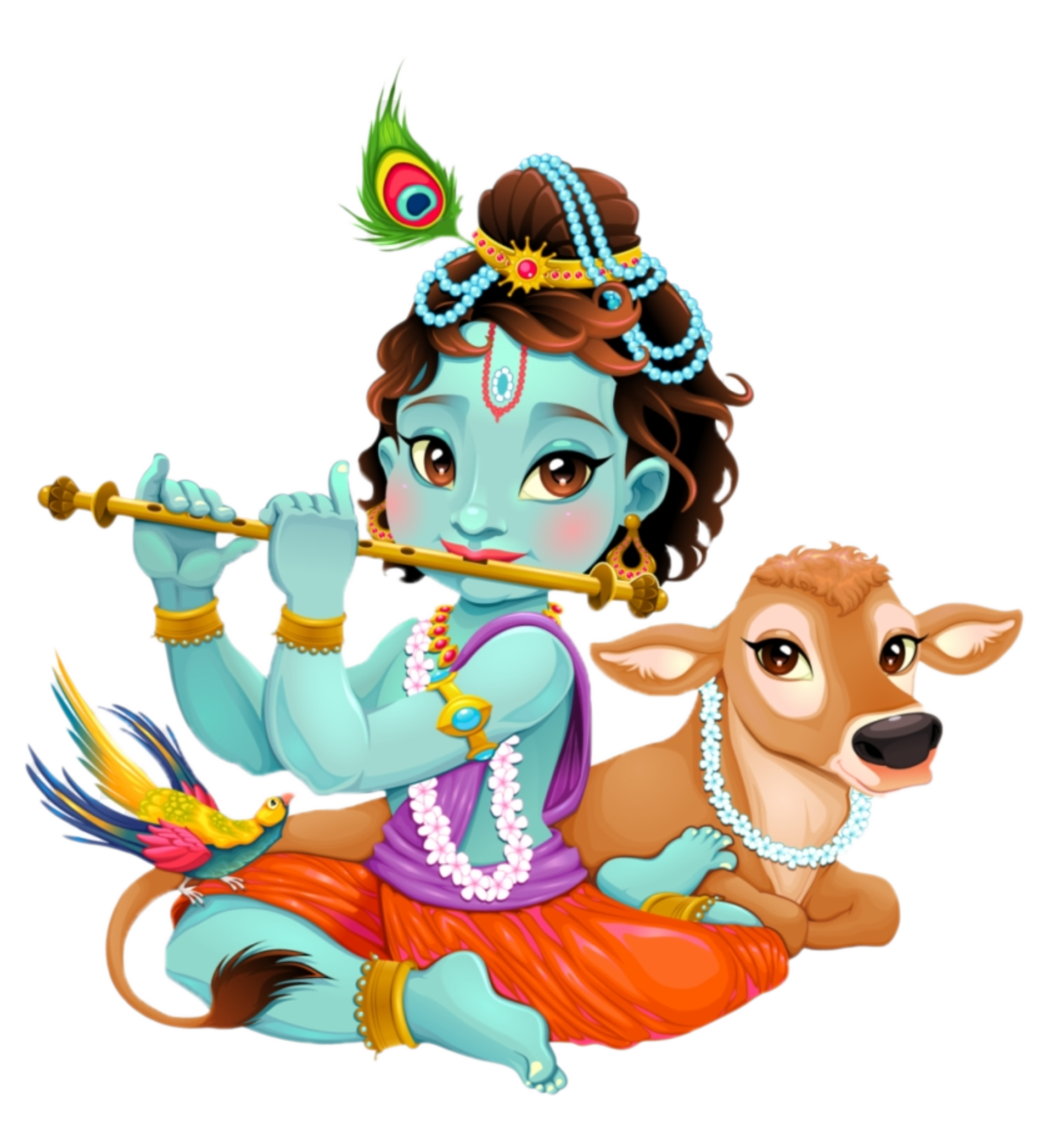 Parambrahma, Bhagavān. What is the meaning of ‘ayam’?
Parambrahma, Bhagavān. What is the meaning of ‘ayam’?
Śrīpāda Mādhava Mahārāja: ‘Ayam’ means singular number.
Śrīla Bhaktivedānta Nārāyaṇa Mahārāja: The word is not used for souls. If Paramātmā, Kṛṣṇa, is realized, all souls will automatically be realized. So, ayam ātmā. He is not realized by…
Śrīpāda Āraṇya Mahārāja: Pravacanena, giving learned discourses. Na medhayā. He is not realized by the application of your intelligence and speculation. Na bahunā śrutena. Not even by studying all the Vedas and all the Śrutis. It is not possible. The Supreme Lord is revealed to that person upon whom He bestows His mercy. By His sweet will He can manifest to someone. Otherwise He can never be understood.
Śrīla Bhaktivedānta Nārāyaṇa Mahārāja: What is the purport?
Śrīpāda Āraṇya Mahārāja: The purport is that only by serving the lotus feet of a sad-guru, by pleasing the Supreme Lord through His representative, the bona fide guru, can one come to know the Absolute Truth.
Śrīla Bhaktivedānta Nārāyaṇa Mahārāja: Service is not so simple that all can serve Him. How can you serve Him?
Śrīpāda Āraṇya Mahārāja: By serving guru.
Śrīla Bhaktivedānta Nārāyaṇa Mahārāja: You should think that intelligence will not do anything. You cannot understand any scripture – Śrīmad-Bhāgavatam, Śrī Caitanya-caritāmṛta, or any transcendental scripture – by intelligence or by learning. You cannot understand by hearing from so many Ṣaṇḍas and Amarkas (Ṣaṇḍa and Amarka were the two materialistic teachers of Śrī Prahlāda Mahārāja), those who don’t know. Only by what?
Śrīpāda Āraṇya Mahārāja:
bhaktis tu bhagavad-
bhakta-saṅgena parijāyate
sat-saṅgaḥ prāpyate pumbhiḥ
sukṛtaiḥ pūrva-sañcitaiḥ
(Bṛhan-nāradīya Purāṇa 4.33; Hari-bhakti-vilāsa 10.279)
“Bhakti becomes manifest by the association of the Lord’s devotees. The association of devotees is obtained by previously accumulated piety.”
Śrīla Bhaktivedānta Nārāyaṇa Mahārāja: We should pray, “I have no realization or real understanding. I have offered myself unto your lotus feet. Please, pracodayāt.” In all mantras you will see the word pracodayāt. “Please mercifully manifest yourself, as you are, in my heart.” If anyone has unconditionally surrendered in this way, he becomes a qualified person. Kṛṣṇa will manifest to that person. Lord Nārāyaṇa Himself told so many things to Brahmā, “Who am I? What is this world? What is prema-bhakti? He explained these truths, but Brahmā could not realize them. So what did He do? He said, “Oh, I am manifesting myself in your heart because you are surrendered.”
Nowadays, people want to use their intelligence. They don’t want to surrender. They have no belief, no strong  faith, in the words of Gurudeva. They have no faith even in the transcendental words of śāstra, or in the holy name. They think, “I must go to any job and make some money.” They do not depend on the chanting of the holy name, and they do not surrender to their Gurudeva.
faith, in the words of Gurudeva. They have no faith even in the transcendental words of śāstra, or in the holy name. They think, “I must go to any job and make some money.” They do not depend on the chanting of the holy name, and they do not surrender to their Gurudeva.
Contrary to this, Vyāsadeva gave up everything.
bhakti-yogena manasi
samyak praṇihite ’male
apaśyat puruṣaṁ pūrṇaṁ
māyāṁ ca tad-apāśrayām
(Śrīmad-Bhāgavatam 1.7.4)
[“He fixed his mind, perfectly engaging it by the linking process of devotional service without any tinge of materialism. Thus he saw the Absolute Personality of Godhead along with His external energy, which was under full control.”]
He surrendered himself completely. At once he saw apaśyat puruṣaṁ pūrṇaṁ. He saw Kṛṣṇa with Rādhikā, all the gopīs, Nanda, Yaśodā, and all their pastimes. It was like seeing a film. From Kṛṣṇa’s birth to His Dvārakā-līlā, Vyāsadeva saw all the secret truths, and then he wrote Bhāgavatam.
yasyāṁ vai śrūyamāṇāyāṁ
kṛṣṇe parama-pūruṣe
bhaktir utpadyate puṁsaḥ
śoka-moha-bhayāpahā
(Śrīmad-Bhāgavatam 1.7.7)
[“Simply by giving aural reception to this Vedic literature, the feeling of loving devotion to Lord Kṛṣṇa sprouts up at once to extinguish the fire of lamentation, illusion, and fearfulness.”]
We should therefore have a much stronger belief in the name, and also in hearing hari-kathā from Śrī Śukadeva Gosvāmī. We should offer our hearts to them in śaraṇāgati. More than śaraṇāgati, we should do ātma-nivedanam. Śaraṇāgati will not do so much. It is the entrance gate to bhakti. After śaraṇāgati comes śravaṇaṁ, kīrtanaṁ, viṣṇoḥ-smaraṇaṁ, pāda-sevanam, arcanaṁ, vandanaṁ, dāsyaṁ, sakhyam, and ātma-nivedanam. Arjuna is also ātma-nivedanam, but not in full. Bali Mahārāja is also, but not in full. Śaraṇāgati is also in Hanumān, but it is not full. It is in the Pāṇḍavas and Uddhava, but not full. Even in Dvārakā, in Rukmiṇī and Satyabhāmā, it is not full. It is extremely high in Yaśodā, but not in full. She cannot give her body for the service of Kṛṣṇa as the gopīs can. Their ātma-nivedanam is complete. Do you understand?
Śrīla dāsa: I can only hear more.
Vrajanātha dāsa: So in this world, the highest surrender is to be always hearing from that Vaiṣṇava who is so exalted?
Śrīla Bhaktivedānta Nārāyaṇa Mahārāja: But only rare persons can do this. Generally, those who have no sukṛti will go to a false guru.
Devotee: Mahārāja, this is [Name withheld], this young lady. Her husband is [Name withheld].
Lady devotee: I’ve been sitting here trying to get up the courage to ask some questions.
Devotee: She is [Name withheld]’s daughter.
Śrīla Bhaktivedānta Nārāyaṇa Mahārāja: Oh, she is a very good devotee.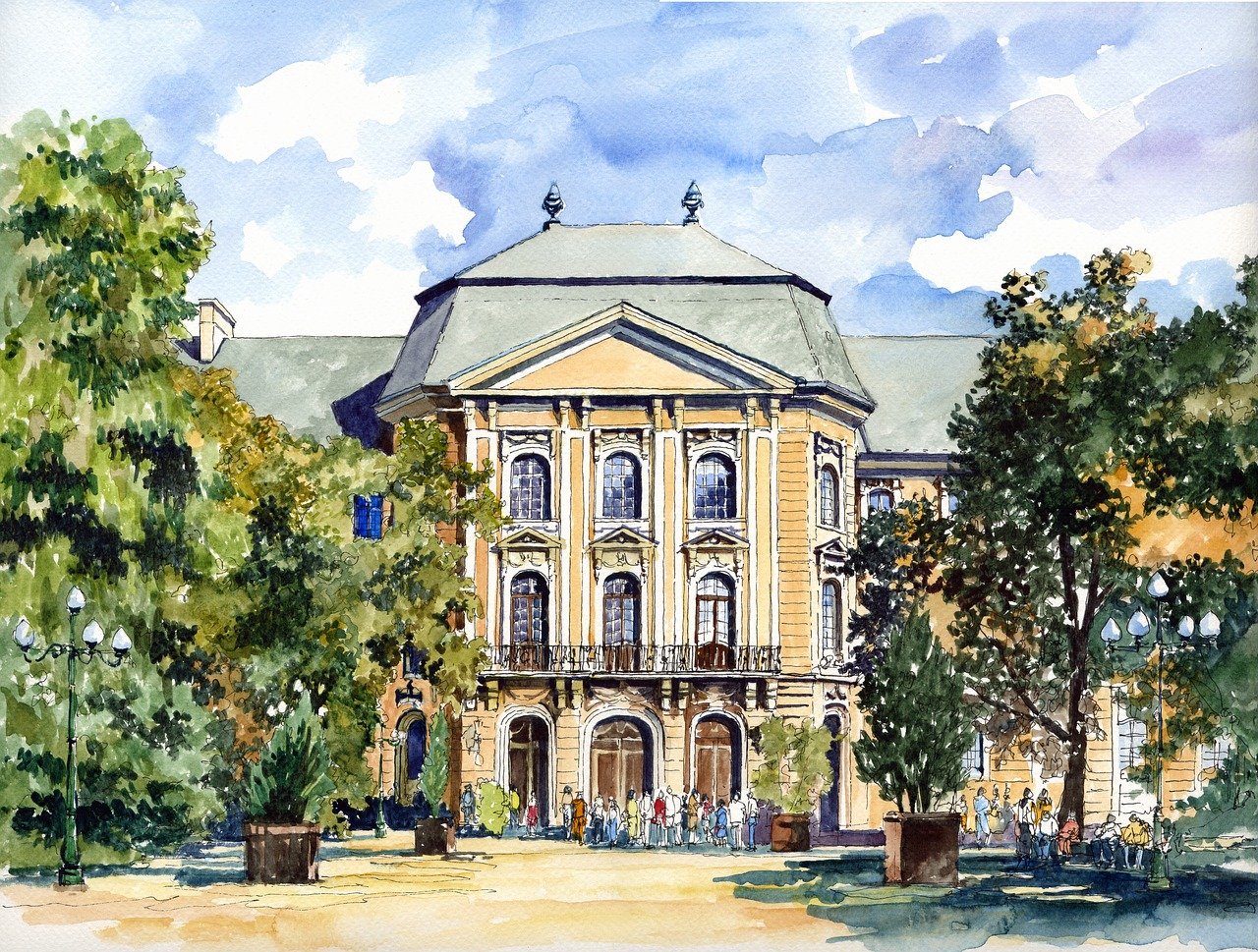
Devotee: She’s a graduate of [the] gurukula and also of the university.
Śrīla Bhaktivedānta Nārāyaṇa Mahārāja: What question do you have?
Lady devotee: We recently had a member of our family pass away. She was initiated by Śrīla Prabhupāda. She had dedicated her whole life to serving Kṛṣṇa. She had very few possessions. She was a very humble devotee. I’m wondering, when a devotee very suddenly passes away before old age, due to poor health or some circumstance, is that person going to be with Kṛṣṇa? Are they taking birth immediately again in another body? Or, is there a subtle body that stays until the gross body is cremated? I’m not knowing what happens.
Śrīla Bhaktivedānta Nārāyaṇa Mahārāja: Continue what you are saying.
Vrajanātha dāsa: She’s asking, is the process not complete until the ashes are given to the Ganges? Or, will that soul reach her destination before or after the ashes of the gross body are offered to the Ganges or Yamunā? Or, what is the destination?
Śrīla Bhaktivedānta Nārāyaṇa Mahārāja: It depends on the devotee. It depends on whether she has really taken initiation or not – in the real, true sense. It depends on whether one is chanting kṛṣṇa-nāma properly and purely or not. Was she realizing her position or not? Has she attained niṣṭha (the stage of steadiness in bhakti) or not? Has she attained the last fraction of bhakti – śraddhā? If one actually has śraddhā, he will think, “Even if anyone will cut me in so many pieces, I cannot give up harināma. Was there even a transcendental śraddhā? 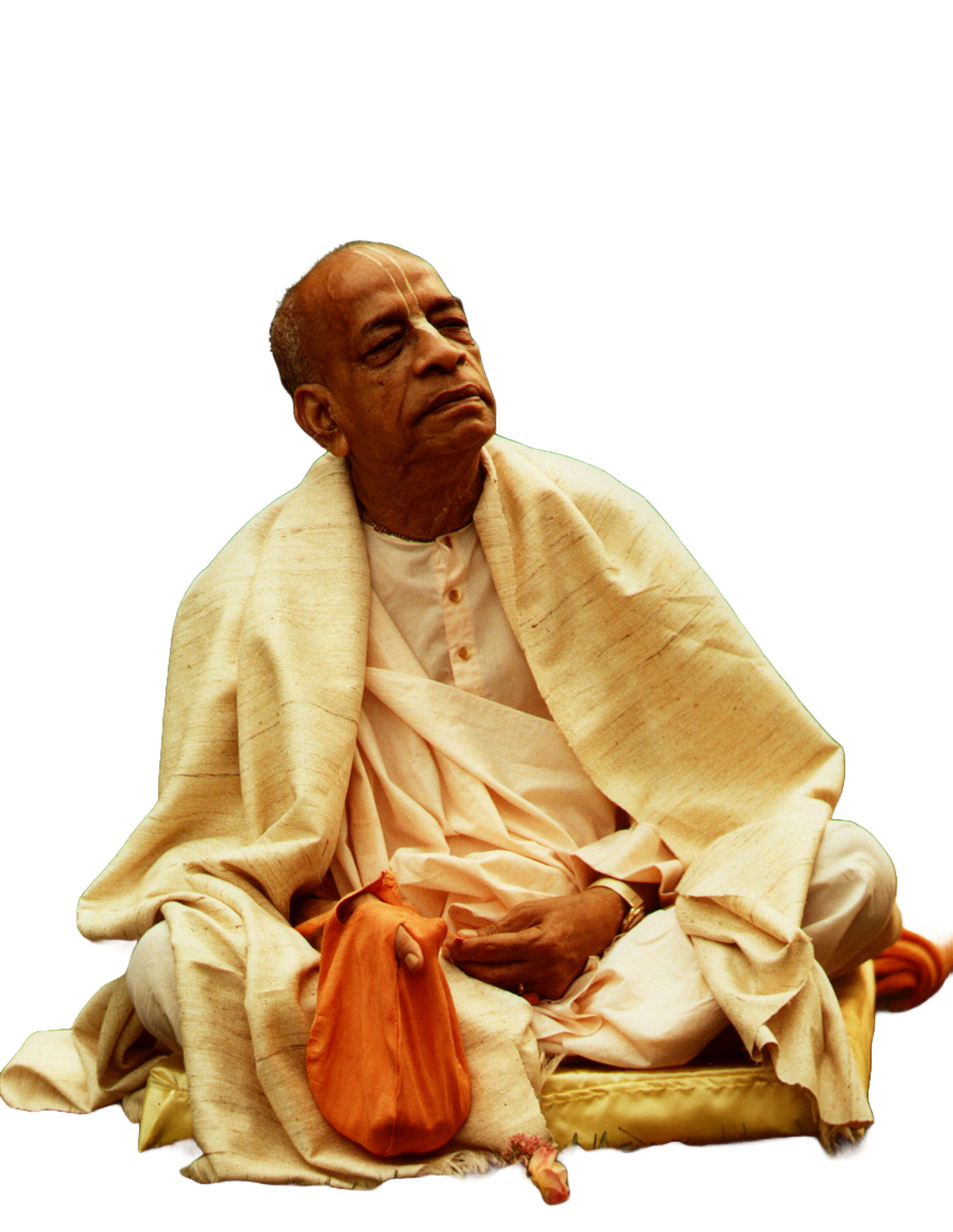 Was there some desire to serve Kṛṣṇa in the real sense? Perhaps she died without this. She was a pious person, and doing some sukṛti. Perhaps she wanted to always have good association. She was doing so much book distribution, making money and giving it to Śrīla Svāmī Mahārāja out of duty, but she was never in high-class association. Perhaps her śraddhā was still weak. In that case, whether her body was burned or put in a grave, there was no harm.
Was there some desire to serve Kṛṣṇa in the real sense? Perhaps she died without this. She was a pious person, and doing some sukṛti. Perhaps she wanted to always have good association. She was doing so much book distribution, making money and giving it to Śrīla Svāmī Mahārāja out of duty, but she was never in high-class association. Perhaps her śraddhā was still weak. In that case, whether her body was burned or put in a grave, there was no harm.
She may then take birth anywhere, in an ordinary devotee’s house. Do you understand? In the home of a general devotee. There she may hear from childhood that only by serving Kṛṣṇa can anyone be happy. Otherwise one can never be happy. In this next birth, she is chanting from the very beginning, but not purely. There are so many worldly desires and her heart is still not pure. So many anarthas, unwanted things, are there. Yet, gradually, she will come into the association of a somewhat higher devotee. There she will understand what is śraddhā. From the beginning she will have a better chance to attain niṣṭha. In her past life she had never attained niṣṭha. Do you know what is niṣṭha? I know you don’t know.
Lady devotee: I don’t remember.
Śrīla Bhaktivedānta Nārāyaṇa Mahārāja: Niṣṭha (steadiness in bhakti). By intelligence one will determine, “I must chant, because there is no other way for success.” At this stage one is not realized, but still there is a very strong determination. He will not think, “Should I marry; should I not marry? Nārada never married, but the father of Śukadeva, Vyāsadeva, did. What should I do?” In śāstra it has been written that this world is like a well. What is that well? To marry and to be very attached to one’s family. If one is attached to Kṛṣṇa, will he be attached to this world? Without such attachment to Kṛṣṇa, one is in dilemma about what to do, “Should I remain in my house with my father, mother, wife and children, or should I give up all these things and be in high-class association, always chanting, hearing, and developing my faith?” He’s now in a dilemma. This is not niṣṭha-bhakti.
Do you understand? Niṣṭha will come, but it is not there yet. If one dies in this stage, what will happen? He was without niṣṭha. Rather, he was in a dilemma about what to do. In that case, in his next birth he will seek a higher class of association, and now he may have niṣṭha. Now he has determined, “Oh, I should be in worldly life and, like the Pāṇḍavas, like the gopīs, I will do bhajana.” Or, he will determine, “I will be like Śukadeva Gosvāmī, I will 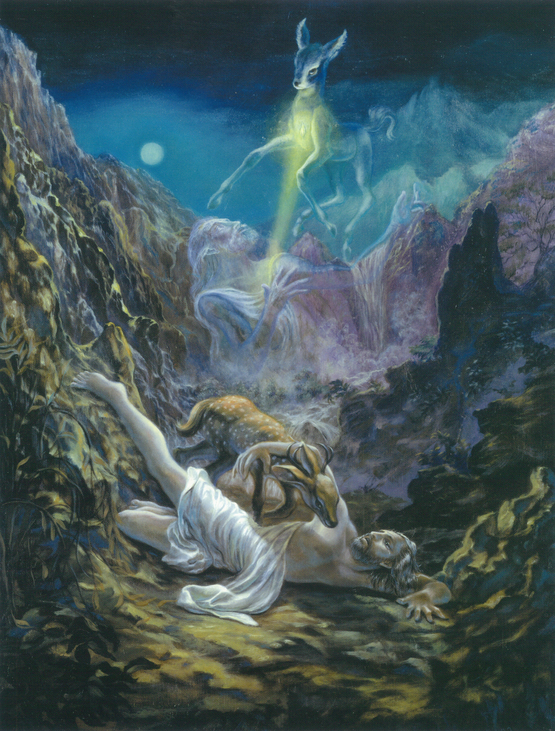 not marry.” He has decided; he has concluded, “And I will always serve Vaiṣṇavas.” In his second birth Bharata Mahārāja decided, “I will never be bound by worldly desires, or anything which can create attachment and diminish my attachment to Kṛṣṇa.” He has decided this.
not marry.” He has decided; he has concluded, “And I will always serve Vaiṣṇavas.” In his second birth Bharata Mahārāja decided, “I will never be bound by worldly desires, or anything which can create attachment and diminish my attachment to Kṛṣṇa.” He has decided this.
Suppose a taste has come for chanting and remembering hari-kathā. Ruci, a taste has come, and suppose that he dies in the stage of ruci. What will become of him? Now he has come to the standard of bhakti. If he dies at this stage Kṛṣṇa will manage that he will go to any high class of guru. There, serving him and always hearing from him, āsakti, attachment for Kṛṣṇa, may come.
If he dies in the stage of āsakti, what will become of him? Oh, he will surely take birth in the house of a very exalted Vaiṣṇava. In [the] Gītā it has been told, “Śucīnāṁ śrīmatāṁ gehe.” From there he will practice his sādhana only for attaining bhāva-bhakti. From that stage it may be that in one birth, two births, a hundred births, or a thousand births, he may attain śuddha-prema, śuddha-sattva, and that is rati (bhāva).
If anyone dies in the stage of rati, he has nothing to do. Surely he will become like Śrī Śukadeva Gosvāmī, Śrī Nārada Gosvāmī, Śrīla Rūpa Gosvāmī, and Śrīla Sanātana Gosvāmī. From the beginning he will start his śuddha-sattva bhakti, his rati or bhāva. Then, if he is qualified in rati, matured in rati, what will happen? At once, when he leaves his body, Yogamāyā at once manages that his soul should go to Mahāprabhu. He will go to the planet and place where the līlā, pastimes, of Mahāprabhu are going on. There he will chant and remember with a high class of rati, in the association of Śrī Rūpa Gosvāmī, Śrī Sanātana Gosvāmī, Śrī Svarūpa Dāmodara and Śrī Rāya Rāmānanda.
If he gives up his body after he has matured in this rati, Yogamāyā will take him where Kṛṣṇa’s pastimes are going on, and he will come in the womb of any gopī – according to his taste, or in other words, according to his specific relationship with Kṛṣṇa. If he is in a relationship of friendship, he will come like a brother of Śrīdāmā, Subala, Madhumaṅgala, and others like them. If he is in the relationship of vātsalya, parental affection, then he will come like Nanda Bābā and Yaśodā. For perfecting any of these relationships he will have to come through the womb of any gopī. And, if he is seriously following Śrīla Rūpa Gosvāmī – if he is not only rāgānuga, but especially rūpanuga, then he will come in the womb of a special gopī. When he (she) grows up she will be married anywhere, especially in Yāvaṭa, and she will be associated with a high class of kāya-vyūha (a gopī who is a bodily expansion) of Śrīmatī Rādhikā. If that association is closed to her, then the door of her home will be closed, or locked, and she will give up her life and meet Kṛṣṇa by her separation mood. And, if she is associated with nitya-siddha, gopīs, then she will meet Him very quickly. If there is a trace of unwanted things, if there are any children, one cannot join rāsa by that body, not even if one has come by the womb of a gopī. Never. Her husband will check her, and she will give up this body. Of course it is not that one can give up the body; there is no death there. So she gives up that mood that, “He is my child and he is my husband.” At that time all obstacles will go away, and Yogamāyā will then take her to rāsa, and take her to serve the gopīs.
There are so many laws, as in court; so many laws or rulings for different aparādhas. Suppose you take a gun and play with it, and by chance a man is shot and dies. If you can prove that you had no wish to kill him, that it happened by chance, by accident, you may be given very little punishment – not death. However, if you have a motive to kill anyone, and if you have aimed your gun at him and shot it, but the person was not shot, still you will have to go to court and be punished severely. There are so many laws, and all these laws have come from these transcendental laws. This is the shadow of that.
If anyone is chanting three lakhs of names, always reading books and serving so much, and he also has some  worldly motivation, what will be the result? His whole bhakti is poisoned. He is performing those activities for himself. However, suppose anyone appears like a King, not doing anything, not chanting much harināma – like Śrīla Rūpa Gosvāmī, and Śrīla Raghunātha dāsa Gosvāmī. He is simply calling out, “O Kṛṣṇa”. Fainting, he cannot chant. Even in one entire day it may be that he cannot even chant sixteen rounds. Even by chanting one Kṛṣṇa name, he faints for the whole day and night, and he is serving Kṛṣṇa internally. Tears are always coming. He is always weeping, weeping, his bodily hairs are standing on end, and all sāttvika-bhāvas are coming. So he cannot chant, though he wants to. What will be the result? He will become more than Haridāsa Ṭhākura. Śrīla Rūpa Gosvāmī and Śrīla Raghunātha dāsa Gosvāmī wanted to chant but they could not. Saṅkhyā-pūrvaka.
worldly motivation, what will be the result? His whole bhakti is poisoned. He is performing those activities for himself. However, suppose anyone appears like a King, not doing anything, not chanting much harināma – like Śrīla Rūpa Gosvāmī, and Śrīla Raghunātha dāsa Gosvāmī. He is simply calling out, “O Kṛṣṇa”. Fainting, he cannot chant. Even in one entire day it may be that he cannot even chant sixteen rounds. Even by chanting one Kṛṣṇa name, he faints for the whole day and night, and he is serving Kṛṣṇa internally. Tears are always coming. He is always weeping, weeping, his bodily hairs are standing on end, and all sāttvika-bhāvas are coming. So he cannot chant, though he wants to. What will be the result? He will become more than Haridāsa Ṭhākura. Śrīla Rūpa Gosvāmī and Śrīla Raghunātha dāsa Gosvāmī wanted to chant but they could not. Saṅkhyā-pūrvaka.
saṅkhyā-pūrvaka-nāma-gāna-natibhiḥ kālāvasānī-kṛtau
nidrāhāra-vihārakādi-vijitau cātyanta-dīnau ca yau
rādhā-kṛṣṇa-guṇa-smṛter madhurimānandena sammohitau
vande rūpa-sanātanau raghu-yugau śrī-jīva-gopālakau
Śrī Ṣaḍ-gosvāmyaṣṭakam, Verse 6
[Perpetually immersed in singing, dancing, and heartfelt kīrtana [of the name, form, qualities, pastimes, associates, and realm] of Śrī Kṛṣṇa, the six Gosvāmīs embody the ocean of nectarean love. Dear to both gentlemen and ruffians, always engaged in pleasing activities, and completely free from envy, they are adored by all. They are the recipients of Śrī Caitanya’s mercy, and they therefore remove the burden of the earth. I worship Śrī Rūpa, Śrī Sanātana, Śrī Raghunātha Bhaṭṭa, Śrī Raghunātha dāsa, Śrī Jīva, and Śrī Gopāla Bhaṭṭa (the six Gosvāmīs).]
They would pass their time by daily chanting a fixed number of holy names, singing particular songs, and offering regulated obeisances [to saints, deities, and the Lord’s pastime places]. Thus they fully conquered the urges of eating, sleeping, recreation, and so forth. Always considering themselves to be unlimitedly lowly and insignificant, they became enchanted in sweet rapture by remembering Śrī Śrī Rādhā-Kṛṣṇa’s qualities. I worship Śrī Rūpa, Sanātana, Raghunātha Bhaṭṭa, Raghunātha dāsa, Jīva, and Gopāla Bhaṭṭa Gosvāmīs.
They were calling out, “He rādhe vraja-devīke.” “O Kṛṣṇa, where are you?” They went to Girirāja Govardhana and there they were weeping still more. Then they went to Nandagaon, Varṣāṇā, and here and there. They were always lamenting. When will they count their names?
Mahāprabhu was at the Ratha-yātrā festival – for the whole day. What was He doing? He was calling out, “Sei ta 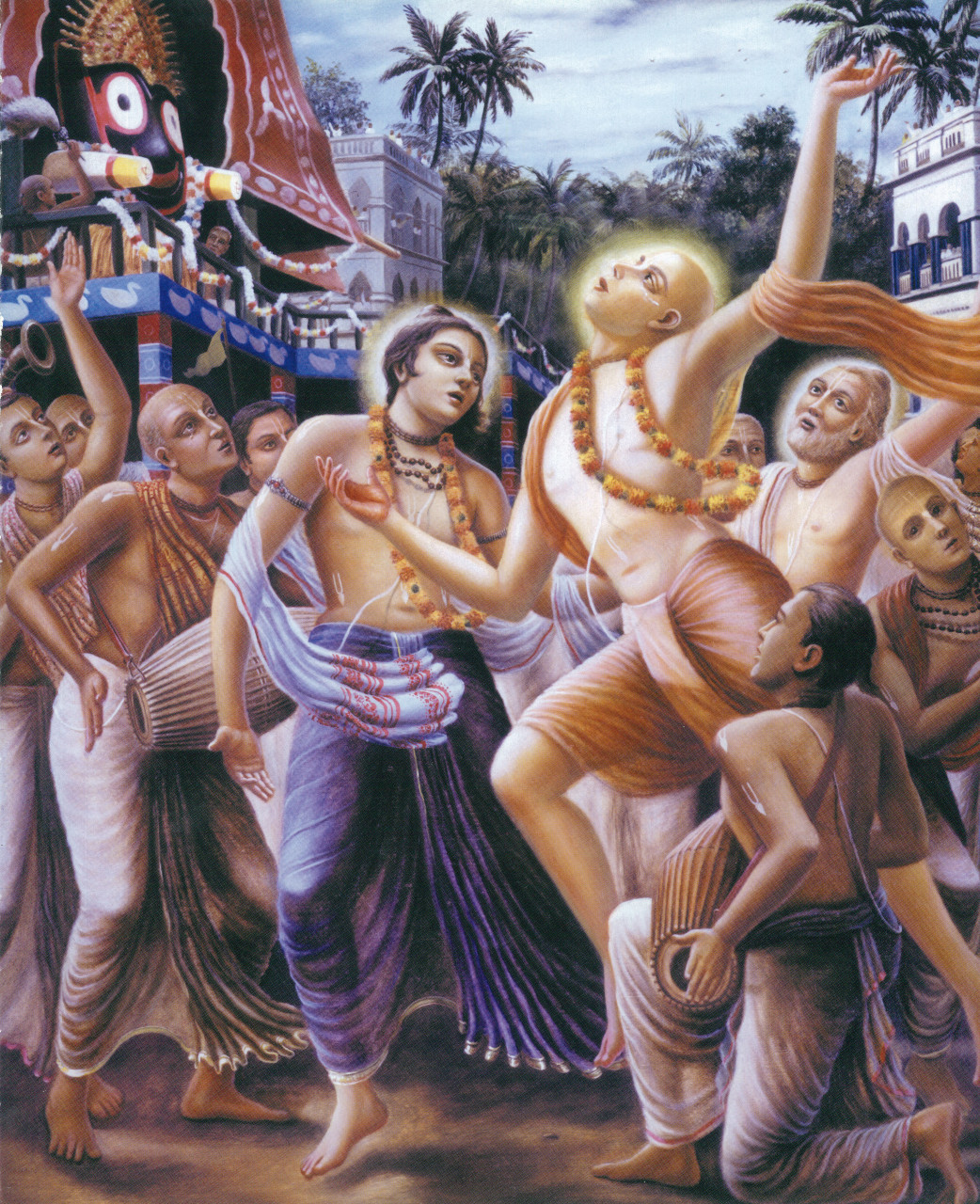 parāṇa-nātha pāinu. My beloved, I have now met you”, and He became faint. For the whole day he was doing this, here and there. Has He completed his rounds? After the festival, when He went to Gambhīrā, He was lamenting with Śrī Rāya Rāmānanda, “Where is my Kṛṣṇa?” “Oh, Kṛṣṇa is in your heart”. Then He became very happy. He wanted to see Kṛṣṇa. He was lamenting like this until morning. When will He complete His chanting? This is also true for Śrī Svarūpa Dāmodara, who was always pacifying Mahāprabhu. When will He have time to chant? This is more than chanting. Oh, this is the fruit of chanting. Do you understand somewhat? I have told this in so much detail, so it may be that you cannot understand.
parāṇa-nātha pāinu. My beloved, I have now met you”, and He became faint. For the whole day he was doing this, here and there. Has He completed his rounds? After the festival, when He went to Gambhīrā, He was lamenting with Śrī Rāya Rāmānanda, “Where is my Kṛṣṇa?” “Oh, Kṛṣṇa is in your heart”. Then He became very happy. He wanted to see Kṛṣṇa. He was lamenting like this until morning. When will He complete His chanting? This is also true for Śrī Svarūpa Dāmodara, who was always pacifying Mahāprabhu. When will He have time to chant? This is more than chanting. Oh, this is the fruit of chanting. Do you understand somewhat? I have told this in so much detail, so it may be that you cannot understand.
Lady devotee: In my understanding, it depends on the person’s level of faith.
Śrīla Bhaktivedānta Nārāyaṇa Mahārāja: Oh, don’t try to take your understanding. Always try to understand the understanding of our guru-paramparā. Otherwise you cannot understand. Your intelligence always fails. Always fails. Try to forget your understanding and try to accept the understanding of our guru-paramparā. Especially Śrī Rūpa and Śrī Raghunātha, and more recently, in the very simple words of Śrīla Bhaktivinoda Ṭhakūra. His words are very simple.
And follow also Śrīla Bhaktivedānta Svāmī Mahārāja, but in a real sense. If all the devotees, sannyāsīs and so many brahmacārīs with saffron cloth were serving him and following him, then why did they leave the institution? Why all this? Why did they leave and become weak? Why? It means that they are not aware of what Śrīla Svāmī Mahārāja wanted. They were not following so much. They were following like this, they were making money even by selling gāñjā, pāna. They thought, “No harm. We should make money for Prabhupāda.” But your Prabhupāda has never, never told them to do that.
So we should try to give up our understanding, and try to fulfil our hearts by our guru-paramparā. Do you understand? If so, then you can realize, you’ll have a taste in chanting and remembering, and there will be no doubts.
Lady devotee: What I wonder is, if our goal is to serve Kṛṣṇa, and to serve guru, then why is there so much arguing amongst each other? “I belong to this group, I follow this person, I belong to that group.”
Śrīla Bhaktivedānta Nārāyaṇa Mahārāja: Because our goal is not fixed. What is your goal? Do you know? I know that you have a goal to serve, but in what way? We should serve the devotees.
Vanamālī dāsī: Of course.
Śrīla Bhaktivedānta Nārāyaṇa Mahārāja: Of course? Can you serve all the devotees as you are serving your husband?
Lady devotee: I can try.
Śrīla Bhaktivedānta Nārāyaṇa Mahārāja: I know you cannot. You cannot tell, or not tell. But I can tell. You cannot serve. Service requires a special relation. Now our goal is not fixed. What is our goal? “I should serve Kṛṣṇa. I am an eternal servant of Kṛṣṇa”. But what kind of servant are you? This goal must be fixed, and it will come if you are initiated in the true sense; not only by a fire sacrifice or when the guru changes your name. Simply that will not do. Śrīla Vyāsadeva initiated Śrīla Śukadeva Gosvāmī. Nārada initiated Vyāsadeva. Brahmā initiated Śrī Nārada. Śrī Caitanya Mahāprabhu initiated Rūpa. Who is the guru of Śrīla Rūpa Gosvāmī? Caitanya Mahāprabhu is his guru. But we see there was no fire sacrifice performed. Mahāprabhu never directly gave any mantra. Still, Śrīla Rūpa Gosvāmī always thinks that Mahāprabhu is his Guru.
This is called transcendental initiation. And ours – although with fire sacrifice – after some days we become weak  and give up everything. Again we take fish, eggs and so on. This ‘initiation’ is really for kaniṣṭha adhikārīs, to fix in their minds that, “Oh, I am initiated.” You must follow the rules. By this you are admitted to the class or the school of initiation. When you will be matured, you will realize your special relationship with Kṛṣṇa. What is the relationship? Kṛṣṇa is my friend or son, or Kṛṣṇa is my beloved. What kind of beloved? There are so many things to be learned. When that learning is completed, you will realize this special relation with Kṛṣṇa, and all your unwanted things will go. Dīkṣā: Di — divya jnāna, and kṣā – all unwanted things will go. Then it is really dīkṣā. Otherwise dīkṣā is not completed. I think it is very rare in this world that the goal is achieved. At this time one is really a devotee.
and give up everything. Again we take fish, eggs and so on. This ‘initiation’ is really for kaniṣṭha adhikārīs, to fix in their minds that, “Oh, I am initiated.” You must follow the rules. By this you are admitted to the class or the school of initiation. When you will be matured, you will realize your special relationship with Kṛṣṇa. What is the relationship? Kṛṣṇa is my friend or son, or Kṛṣṇa is my beloved. What kind of beloved? There are so many things to be learned. When that learning is completed, you will realize this special relation with Kṛṣṇa, and all your unwanted things will go. Dīkṣā: Di — divya jnāna, and kṣā – all unwanted things will go. Then it is really dīkṣā. Otherwise dīkṣā is not completed. I think it is very rare in this world that the goal is achieved. At this time one is really a devotee.
Gaura-premānande!
Source: Purebhakti.com
Image(s) made possible by Pixabay.com, Krishnapath.org and/or Bhaktiart.net
Unless indicated differently, all verse translations and quotes are from the books by Śrīla Prabhupāda (Vedabase.com)








